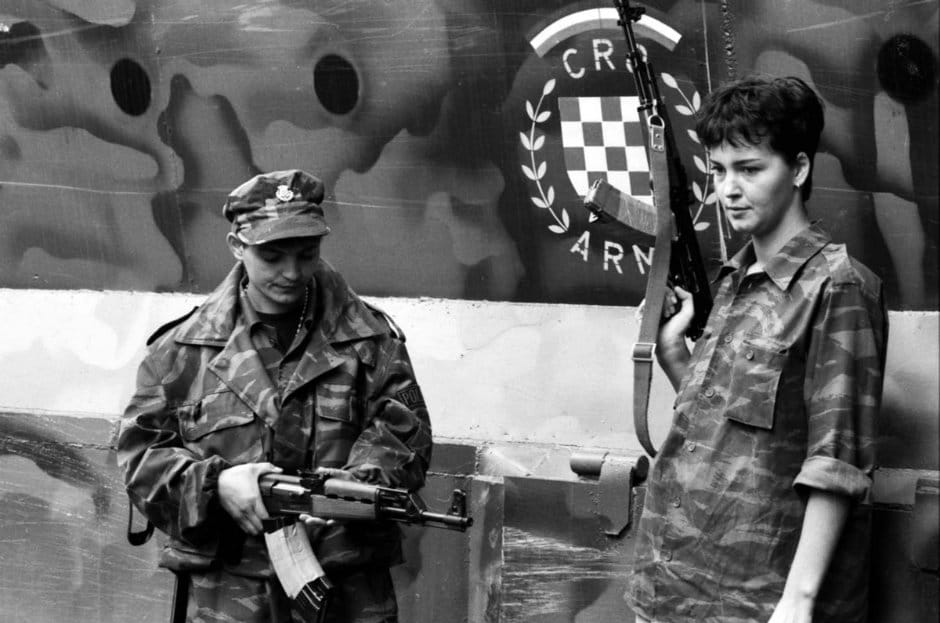« Cela devait être fait par les mères seules : »: Notes de recherche sur l'expansion de l'action des femmes pendant la guerre pour la patrie croate

Publié 2024-05-09
Mots-clés
- Histoire des femmes,
- agentivité,
- activisme,
- droits humains,
- guerre d'indépendance croate
© Matthew Cerjak (Author) 2024

Cette œuvre est sous licence Creative Commons Attribution - Pas d'Utilisation Commerciale - Pas de Modification 4.0 International.
Comment citer
Résumé
Dans les années avant, pendant et après la guerre pour la patrie croate, des milliers de femmes ont répondu à l’appel pour servir leur nation. Cette note de recherche propose une exploration préliminaire de leurs histoires. Les premières découvertes montrent que dans la période d'avant-guerre, les femmes croates ont créé des réseaux pour tenter de prévenir la guerre; qu’elles ont défié les normes restrictives en matière de genre en servant dans l’armée pendant la guerre ; et qu’après avoir enduré des atrocités indescriptibles pendant la guerre, elles ont utilisé leur service en temps de guerre pour améliorer la représentation politique des femmes. Soulignant leur rôle central dans la refonte des normes sociétales en période de conflit, les premières recherches parcourent des résultats qui montrent que les femmes croates ont renforcé leur capacité d'action («agentivité ») pour améliorer leur statut pendant la reconstruction d'après-guerre en organisant des manifestations avant la guerre, en servant dans les forces armées et en utilisant l'influence politique découlant de leurs réseaux sociaux et de leur service militaire.
Références
- BaBe, B.a.B.e. up-Date (January-April, 1997), 1997. Accessed 8 June 2022. http://balkansnet.org/women/babe02.html.
- BaBe, The Women’s Ad Hoc Coalition ’97 to Influence and Monitor the Elections in Croatia. Zagreb, April 1, 1997. Accessed 6 June 2022. http://www.hartford-hwp.com/archives/62/030.html.
- BaBe, Women’s Human Rights Group. The Status of Women in Croatia. Accessed June 6, 2022. http://balkansnet.org/women/babe.html#babe.
- Croation Parliament. Croatia’s Constitution of 1991 with Amendments through 2013. The Constitute Project, August 26, 2021. Accessed June 6, 2022. https://www.constituteproject.org/constitution/Croatia_2013.pdf?lang=en.
- Cuvalo, Ante, The Croatian National Movement. New York: East European Monographs, 1990.
- Garcia-Prince. Committee on the Elimination of Discrimination Against Women: Fourteenth Session Summary Record of the 279th Meeting. New York: United Nations, January 31, 1995. Accessed 26 April 2024. https://documents.un.org/doc/undoc/gen/n95/802/38/pdf/n9580238.pdf?token=kupm4MulxfyjTKj83h&fe=true
- Griffith, W.E. Communism in Europe: Continuity, Change, and the Sino-Soviet Dispute. Elsevier Science, 2013.
- Inter-Parliamentary Union. Proportion of Seats Held by Women in National Parliaments (%) - Croatia. Accessed May 28, 2022. Accessed 28 May 2022. https://data.worldbank.org/indicator/SG.GEN.PARL.ZS?locations=HR.
- Irvine, Jill A. “'Electoral Breakthroughs in Croatia and Serbia.” Communist and Post-Communist Studies 46, no. 2 (2013): 243–54.
- Kajevska, Ana Miskovska. Feminist Activism at War. Gender and Comparative Politics 1. New York and London: Routledge, 2017.
- Knežević, Đurđa. “Are Good Laws Enough? The Situation of Women in Croatia.” The Heinrich Böll Foundation, December 2013. Accessed 8 June 2022. https://eu.boell.org/sites/default/files/uploads/2013/12/knezevic.are_good_laws_enough.pdf.
- Krčmar, V. “In Memoriam - Višnja Milas Matutinović.” Portal of the Croatian Cultural Council, December 8, 2021. Accessed 28 May 2022. https://www.hkv.hr/izdvojeno/vaiprilozi/ostalo/prilozi-graana/38769-v-krcmar-in-memoriam-visnja-milas-matutinovic-29-2-19.html.
- Matynia, Elzbieta. “Vesna Kesic: In Memoriam.” Public Seminar (blog), December 31, 2020. Accessed 7 June 2022. https://publicseminar.org/essays/vesna-kesic/.
- Mikula, Maja. “Embrace or Resist: Women and Collective Identification in Croatia and Former Yugoslavia since WWII.” In Women, Activism and Social Change, edited by Maja Mikula, 82–98. Routledge, 2009.
- Morokvasic, Mirjana. “Institutionalised Equality and Women’s Conditions in Yugoslavia.” Equal Opportunities International 2, no. 4 (January 1, 1983): 9–17. https://doi.org/10.1108/eb010386.
- Portillo Cure, Marcela del. A Past Gone Missing: Dealing with Contentious and Politicised Pasts Based on the Experience of Human Rights NGOs in Croatia. Unpublished thesis at the University of Zagreb, 2019. Accessed 6 June 2022. https://repository.gchumanrights.org/server/api/core/bitstreams/0b54f32c-d905-4676-b7f4b79b2038bed4/content.
- Promoting Women in Development. Human Rights, Advocacy, and the Empowerment of Women: An Education and Action Project in the Yugoslav Successor States. International Center for Research on Women and The Centre for Development and Population Activities, 1999. Accessed 6 June 2022. https://pdf.usaid.gov/pdf_docs/Pnach368.pdf.
- Ramet, S. P., and D. Matic. Democratic Transition in Croatia: Value Transformation, Education, and Media. Texas A&M University Press, 2007.
- Ramet, Sabrina P. Central and Southeast European Politics Since 1989. Cambridge, UK: Cambridge University Press, 2010.
- Religious News Service Blog Editor. “Aftermath of War: Family Planning Becomes Politically Charged Issue in Post-War Croatia.” Religion News Service (blog), June 14, 1996. Accessed 7 June 2022. https://religionnews.com/1996/06/14/top-story-aftermath-of-war-family-planning-becomes-politically-charged-issu/.
- Šikić-Mićanović, Lynette. “Women’s Contribution to Rural Development in Croatia: Roles, Participation and Obstacles.” Eastern European Countryside 15, no. 2009 (2010): 75–90. https://doi.org/doi:10.2478/v10130-009-0005-5.
- Sliskovic, Marija, ed. Women in the Homeland War. Vol. 8. 8 vols. Zagreb: Zene U Domovinskom Ratu, 2010.
- The Croatian Parliament. 19 May - Croatian Independence Referendum, n.d. Accessed June 6, 2022. https://www.sabor.hr/en/about-parliament/history/important-dates/19-may-croatian-independence-referendum.
- United Nations, Report of the Committee on the Elimination of Discrimination against Women. United Nations, 1998. Accessed 8 June 2022. https://www.un.org/womenwatch/daw/cedaw/reports/18report.pdf.
- World Bank. Population, Female (% of Total Population) - Croatia, 2019. Accessed 29 May 2022. https://data.worldbank.org/indicator/SP.POP.TOTL.FE.ZS?end=2020&locations=HR&start=1989&view=chart.
- Yugoslavia. Constitution of the Federal Peoples Republic of Yugoslavia. Embassy of the Federal Peoples Republic of Yugoslavia, 1946. Accessed June 6, 2022. https://heinonlineorg.jerome.stjohns.edu/HOL/Page?collection=cow&handle=hein.cow/cyugo0001&id=12&men_tab=srchresults#.

